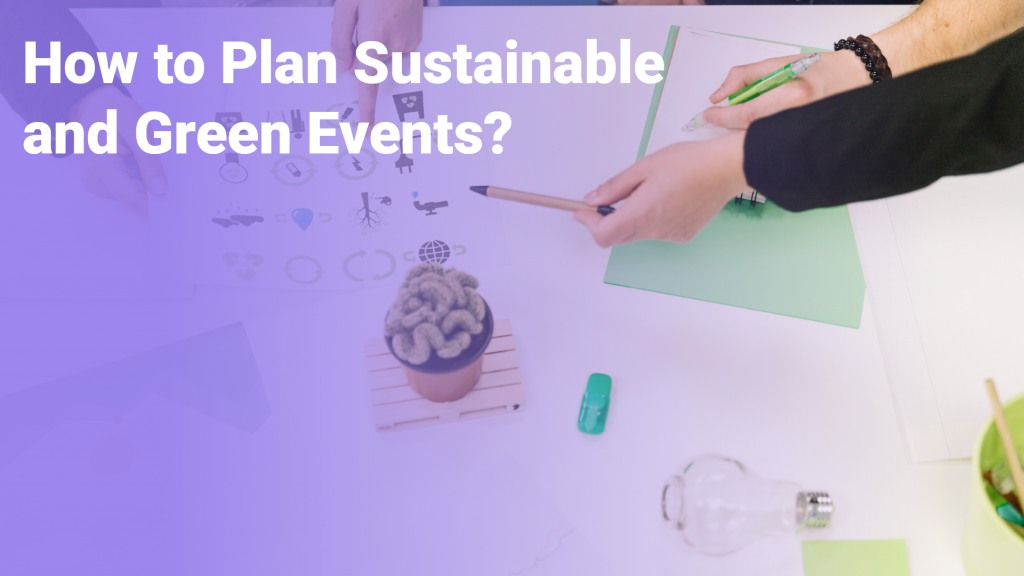
Learn how to plan sustainable and green events that minimize waste, reduce carbon emissions, and promote eco-friendly practices for a better environment. In this informative blog, you’ll discover essential tips and strategies for planning sustainable events. As environmental awareness continues to rise, the desire for sustainable and eco-friendly events is increasing. Whether it’s weddings, business conferences, or music festivals, there is a growing demand for events that prioritize minimizing their carbon footprint and incorporating environmentally friendly practices, all while delivering an exceptional and memorable experience.
With careful planning and consideration, it’s possible to plan events that meet attendees’ expectations and respect the environment. Planning sustainable and green events has numerous benefits, including reducing waste, conserving resources, and minimizing environmental harm. Whether you are planning an intimate gathering or a large-scale event, event sustainability can help to promote your brand, attract like-minded customers, and improve your reputation.
However, organizing eco-friendly events can pose a variety of challenges. Many event planners are unsure of where to start when it comes to sustainable event planning and often don’t know the right strategies to implement. To plan an eco-friendly event successfully, you must be mindful of the sustainability principles and best practices.
Let’s discuss essential tips and strategies for planning sustainable and green events, from choosing a sustainable venue to implementing waste reduction measures and promoting eco-friendly practices to attendees. You can also go with virtual or hybrid events with the help of Online Meeting Software.
How to Organize a Green Event: Tips for Sustainable Planning?
Organizing green events is essential to take action against climate change and promoting sustainable practices. Whether to host a small gathering or a large conference, the following tips will help you organize a sustainable and eco-friendly event:
Choose a Sustainable Venue
When choosing a venue for your event, consider locations with renewable energy sources, LEED certification, and sustainability features. If possible, choose a location close to public transportation or areas where attendees can walk or bike to the event, reducing the carbon footprint and contributing to the health and wellness of all attendees.
Promote Reduce, Reuse, and Recycle
Promoting the principles of reducing, reusing, and recycling is a great way to minimize waste produced during events. You can minimize disposable cups and utensils, implement recycling bins throughout the event area, and encourage attendees to bring their own refillable water bottles to minimize plastic waste.
Use Energy-Efficient Lighting and Equipment
Opting for energy-efficient lighting options such as LED lighting and choosing energy-efficient equipment such as laptops, speakers, and projectors can help reduce the energy consumption of the event.
Opt for Environmentally Friendly Catering Options
Consider selecting a sustainable menu featuring locally-sourced and organic ingredients in season. Plastic water bottles? Avoid them by offering a water station instead and composting the food waste that you’re producing.
Utilize Digital Technology
There are several digital tools that you can utilize to make your event eco-friendlier, such as using electronic ticketing systems, online registration, and digital event communications. Using web-based conference platforms to host a virtual event can also reduce the carbon footprint for the venue and attendees.
Encourage Sustainable Behaviour
Encourage sustainable behaviour among attendees by messaging your green initiatives and goals before the event. Encourage attendees to reuse items and consider carpooling or other sustainable transportation options.
Measure and Analyze Event Impact
It’s critical to track and analyze the impact of your event to identify areas for improvement in sustainability efforts. This can include measuring carbon emissions, waste reduction, and energy usage. Gather feedback from attendees after the event and use that information to make improvements for future events.
Partner with Environmentally Conscious Organizations
Partner with environmentally conscious vendors, speakers, and sponsors that share your sustainability values and can participate in event-related sustainable initiatives.
Creating sustainable events involves considering environmental, social, and economic factors. Here are some guidelines which can help you in the process of organizing sustainable events:
1. Sustainability Guidelines: Develop a set of sustainability guidelines specific to events. These guidelines can outline best practices and strategies for reducing waste, conserving resources, and promoting sustainability throughout the event planning process.
2. Green Event Certification Programs: Consider participating in green event certification programs such as the Leadership in Energy and Environmental Design (LEED) certification or the ISO 20121 standard for sustainable event management. These programs provide frameworks and criteria for evaluating and certifying the sustainability of your event.
3. Event Sustainability Assessment Tools: Use event sustainability assessment tools like the Global Reporting Initiative (GRI) Event Organizers Sector Supplement or the Sustainable Event Standard (SES) to assess and measure the sustainability performance of your event. These tools can help you identify areas for improvement and track progress over time.
4. Waste Management Tools: Implement effective waste management practices by using tools like recycling stations, composting bins, and signage to encourage attendees to recycle and properly dispose of waste. Consider partnering with waste management companies that specialize in sustainable event waste management.
5. Digital Event Solutions: Explore virtual or hybrid event solutions to minimize the carbon footprint associated with travel and infrastructure. Utilize online registration, ticketing, and Virtual Meeting Platforms to reduce paper waste and energy consumption.
6. Sustainable Catering: Work with caterers that prioritize local, seasonal, and organic food options. Ensure that they use compostable or reusable cutlery, plates, and cups. Minimize food waste by accurately estimating attendee numbers and coordinating with local food banks for excess food donation.
7. Transportation Planning: Encourage attendees to use sustainable transportation options such as public transit, carpooling, or cycling. Provide information on nearby public transportation routes, bike parking facilities, and car-sharing services. Consider offsetting event-related travel emissions by supporting carbon offset projects.
8. Energy and Water Conservation: Optimize energy and water consumption during the event by using energy-efficient lighting, motion sensors, and timers. Promote water conservation by using refillable water stations instead of single-use bottles.
9. Stakeholder Engagement: Engage and educate event stakeholders, including organizers, sponsors, exhibitors, and attendees, about the importance of sustainability. Encourage their participation and commitment to sustainable practices.
10. Measurement and Reporting: Establish key performance indicators (KPIs) and track sustainability metrics related to waste diversion, energy consumption, water usage, and carbon emissions. Use these metrics to create sustainability reports and communicate your event’s environmental impact and progress.
Here are some specific tools and resources that can be used to support sustainable event planning:
1. Eventbrite: An online platform that allows you to create event pages, manage registrations, and communicate with attendees digitally, reducing the need for paper-based processes.
2. Eventbaxx: A digital platform that enables you to provide event information, schedules, and materials to attendees through a mobile app, reducing the need for printed materials.
3. CompostNow: A composting service that provides collection and composting solutions for events, helping divert food waste from landfills and promoting sustainable waste management.
4. OpenLitterMap: An app and website that allows attendees to report litter and waste hotspots during events, facilitating better waste management and clean-up efforts.
5. EcoMatcher: A platform that enables event organizers to offset the carbon emissions associated with their event by planting trees or supporting reforestation projects.
6. Sustainable Event Alliance (SEA): An international organization that provides resources, guidelines, and training for event professionals to implement sustainable practices and improve event sustainability.
7. CleanVibes: A waste management and recycling company that specializes in providing sustainable waste solutions for events, including composting, recycling, and waste diversion services.
8. MeetGreenCalculator: An online tool that helps event planners estimate and measure the environmental footprint of their events, including carbon emissions, waste generation, and water usage.
9. MyGreenButler: A sustainability management platform that helps event venues and organizers track and improve their sustainability performance, offering tools for energy monitoring, waste management, and carbon reporting.
10. Sustainable Event Toolkit by the International Union for Conservation of Nature (IUCN): A comprehensive online resource that provides guidance, case studies, and checklists for organizing sustainable events, covering various sustainability aspects.
These tools can assist you in different areas of sustainable event planning, from waste management and carbon offsetting to sustainable transportation and digital engagement. Remember to evaluate their suitability and relevance to your specific event requirements.
Remember to incorporate interactive elements, live discussions, and audience engagement to enhance the virtual event experience. Additionally, leverage digital platforms that prioritize energy-efficient technologies and utilize sustainable hosting services to minimize the environmental impact of the virtual event itself.
Virtual Events and Hybrid Events Both are the Best Way to Organize the Event with Zero Carbon Emission
Virtual events and hybrid events are both excellent choices for event organizers aiming to minimize carbon emissions. Virtual events are entirely online, enabling attendees to participate from anywhere without the need for travel. Hybrid events combine virtual and physical elements, allowing participants to choose their preferred format. This flexibility expands the event’s reach while reducing its carbon footprint.
Both virtual and hybrid events provide opportunities to incorporate sustainable practices, such as reducing paper waste and utilizing energy-efficient technologies. By implementing these measures, event organizers can create environmentally friendly experiences and encourage eco-friendly behavior among attendees.
There are numerous online platforms available that cater to virtual and hybrid events. One highly recommended solution is HuddleXR, a comprehensive platform specifically designed for virtual conferences. HuddleXR offers a diverse array of features, including customizable branding options, tools for seamless audience interaction, virtual booth capabilities, networking functionalities, and immersive 3D virtual environments. With HuddleXR, companies can effortlessly create captivating and interactive experiences for their virtual and hybrid events, all while placing a strong emphasis on reducing their environmental footprint. Additionally, HuddleXR provides built-in sustainability tracking tools that enable event planners to monitor and measure the ecological impact of their events, further promoting sustainable practices and ensuring a more environmentally conscious approach to event organization.
Conclusion
By taking these tips into account, you can organize socially responsible events that promote sustainability and leave a green footprint. By taking these steps, you can reduce the environmental impact of your event. In this way, attendees’ experience is improved, and they will feel part of a good cause: protecting our planet and making it a healthier place for us all.







